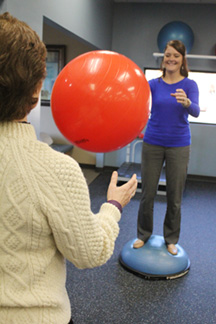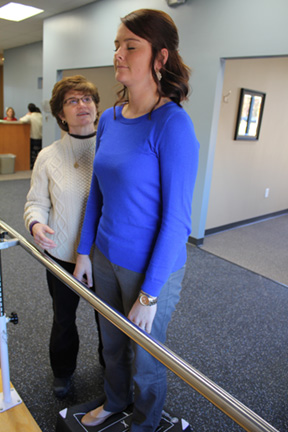
Rebecca English, PT, DPT
Bringing Sense of Balance to the Peninsula as New Director of Tidewater Physical Therapy’s Denbigh Clinic Balance Center Program
By Amanda Kerr, Freelance Writer, Consociate Media
 Technically speaking, balance is the even distribution of weight that enables someone or something to remain upright and steady.
Technically speaking, balance is the even distribution of weight that enables someone or something to remain upright and steady.
But in reality, in life, balance is much more than that. It’s what enables a person to feel sure footed, to feel confident, to feel empowered.
When balance declines, it creates a range of symptoms and sensations such as dizziness or feelings of being faint or unsteady. A loss of balance can also cause dizziness which creates a false sense that a person or their surroundings are spinning or moving, typically referred to as vertigo.
Losing the confidence to move under their own feet can cause patients to doubt themselves and retreat from the world. Unfortunately, the causes of such symptoms can vary greatly and can easily mimic other conditions. For many patients suffering from balance issues or dizziness, getting a correct diagnosis can be difficult.
“A lot of people struggle with dizziness and imbalance for years,” says physical therapist Rebecca English, PT, DPT. “They’ve been going to doctors for relief, but there is only so much they can do to treat the functional deficits that dizziness and balance disorders can create.”
It’s the mystery of such ailments that led English, who joined Tidewater Physical Therapy in late 2015, to become an expert in the treatment of neurological and vestibular disorders. Over the last 15 years, she has refined her diagnostic skills to hone in on potential causes of vestibular disorders (inner ear and brain deficiencies that affect balance) and the best methods for treatment. She also specializes in neurological and gait dysfunction as well as concussion management.

English comes to Tidewater Physical Therapy from Charleston, S.C., where she helped establish specialized balance services for Charleston ENT. English earned her degrees in occupational therapy and physical therapy from the Medical University of South Carolina in 1997 and 2000, as well as a master’s degree in rehabilitation. In 2009, she received her Doctorate in Physical Therapy from A.T. Stills University.
She has also earned competencies from the Emory University School of Medicine in vestibular function testing and interpretation with an application in rehabilitation and in vestibular rehabilitation. She holds an advanced competency in the evaluation and treatment of complex balance disorders.
A nationally renowned speaker on balance and vestibular disorders, English is also an adjunct professor at the Medical University of South Carolina’s College of Health Professions, where she teaches coursework related to vestibular dysfunction in the Doctor of Physical Therapy and neuro-residency program.
It is that highly advanced training and skill that English brings to Tidewater Physical Therapy as one of the firstphysical therapists on the Peninsula to offer balance related therapy at this caliber. As a leader in her field, English is heading up Tidewater Physical Therapy’s new Denbigh Clinic Balance Center program, which serves patients with balance, dizziness and mobility issues.
The program can treat patients suffering from vestibular disorders and inner ear conditions, as well as neurological deficiencies due to stroke, Parkinson’s disease, Multiple Sclerosis or concussion. But patients don’t have to have a diagnosis to receive an evaluation.
“I may not be the final stop but I can help direct patients to the right type of care,” English said. “I’m meeting them where they’re at and getting them on the final road.”
Under English’s guidance, the Balance Center’s fall prevention and vestibular rehabilitation programwill treatpatients suffering from dizziness as well as recurrent falls through individualized treatment plans. The program is designed for patients with neurological disease or inner ear disorders suffering from symptoms of vertigo, poor balance and oculomotor disturbances.
Dizziness is the second most common complaint to primary care physicians and accounts for 11.3 million physician visits per year. A total of 40 percent of the population over 40 will experience a dizziness disorder at some point during their life, according to the National Institutes of Health.
Some conditions, such as vertigo or dizziness from concussion, may improve over time. But many balance patients, particularly those with neurological diseases or impairments, have to learn to live with their symptoms. For those patients, English says treatment must focus on their new reality, rather than recovery.
“We can’t correct the brain for someone with MS,” English says, “but we can help give them strategies and assisted devices to maintain their mobility and independence for as long as possible. There’s a lot of patient education and therapy in terms of functional mobility.”
The difference between treating balance patients and orthopedic patients, English says, is that physical therapy for balance patients isn’t about rebuilding strength or returning their mobility. It’s about giving them strategies to live their lives.
For further information please visit:
www.TPTI.com
Rebecca English is accepting new patients
at the Tidewater Physical Therapy Denbigh Clinic
757.874.0032
PROMOTIONAL FEATURE

